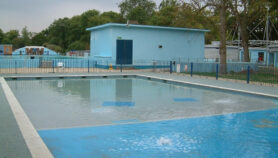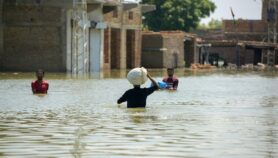By: Joanna Carpenter
Send to a friend
The details you provide on this page will not be used to send unsolicited email, and will not be sold to a 3rd party. See privacy policy.
Technology designed to safeguard water supplies has caused extensive environmental damage in rich countries — and the developing world must pursue a different path, scientists warned today.
Research published in Nature (30 September) reveals that human activities have endangered water security for 80 per cent of the world’s population and threatened the biodiversity of 65 per cent of the world’s rivers.
The researchers urge developing countries to safeguard water supplies in cheaper, more eco-friendly ways.
They have produced global maps of combined threats to human water security and freshwater biodiversity in the world’s rivers. To do this, they used computer models and available data on factors that affect rivers, such as agricultural runoff and loss of wetlands.
Although the developed world faces the greatest water security and biodiversity risks, high investment in quick technological fixes helps them to avoid water shortages.
But, in the long term, these solutions have damaged biodiversity and are endangering ecosystems that depend on freshwater, with knock-on effects for livelihoods.
To avoid these pitfalls seen in the West, developing countries should experiment with new ways of securing drinking water while conserving ecosystems, which can offer other services to society, they said.
Dams could be operated to allow ‘environmental flow’ of water that helps maintain biodiversity; protecting watersheds could reduce costs of treating drinking water; and preserving river floodplains could help protect from floods and sustain rural livelihoods.
"It’s so 20th century to throw piping, concrete and energy at the problem when you could probably economize quite respectably if you simply prevented the issues," Charles Vörösmarty, professor of civil engineering at the City University, New York, and co-author of the study, told SciDev.Net.
Peter McIntyre, assistant professor of zoology at the Center for Limnology [the study of inland waters] of the University of Wisconsin-Madison, United States, and a co-author of the study said: "When we take advantage of the ecosystem services provided by nature, those things come for free. For all the infrastructural, engineering approaches, we tend to focus just on the initial price tag, but they all require active maintenance and have finite lifetimes."
He added that "hundreds of millions of people worldwide depend on catching fish from rivers and lakes as one of their key sources of protein. The world’s most productive freshwater fisheries also tend to be ones that have a whole load of species present."
But others say that poor people cannot afford to wait for the advanced eco-friendly, nature-based solutions and necessary good governance to be in place — they need water storage, treatment now.
Ger Bergkamp director-general of the World Water Council, told SciDev.Net: "It’s probably too ambitious to jump from current levels of development to a very advanced developed society in which we have a minimalistic approach to infrastructure, excellent governance and the resource base on which we can develop the economy."
But he agreed that economies have to develop hand-in-hand with the environment. "We need to look at how nature’s infrastructure can become part of development, but it’s only seeing it through that lens that we actually put a value on those ecosystems that provide a service for poor people, for the fishermen, for the herders, to maintain that. Trying to find that balance [between development and conservation] is where the challenge lies."
Link to full article in Nature
Link to SciDev.Net‘s spotlight on water security and climate change













